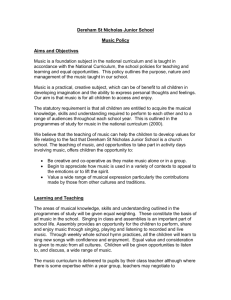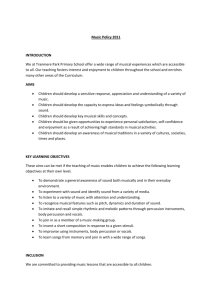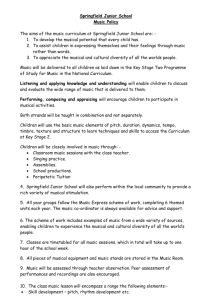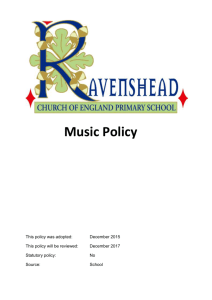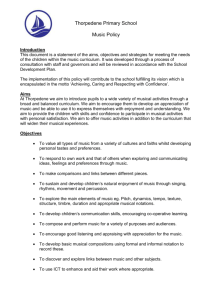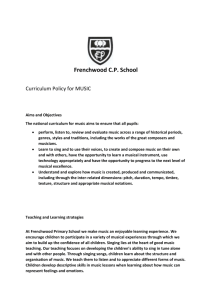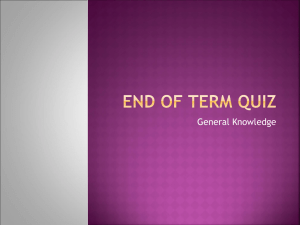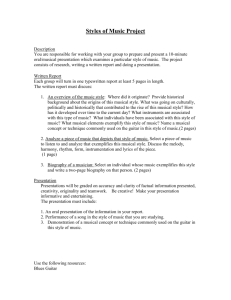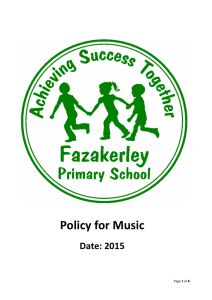Music Policy - Meadow View Farm School
advertisement
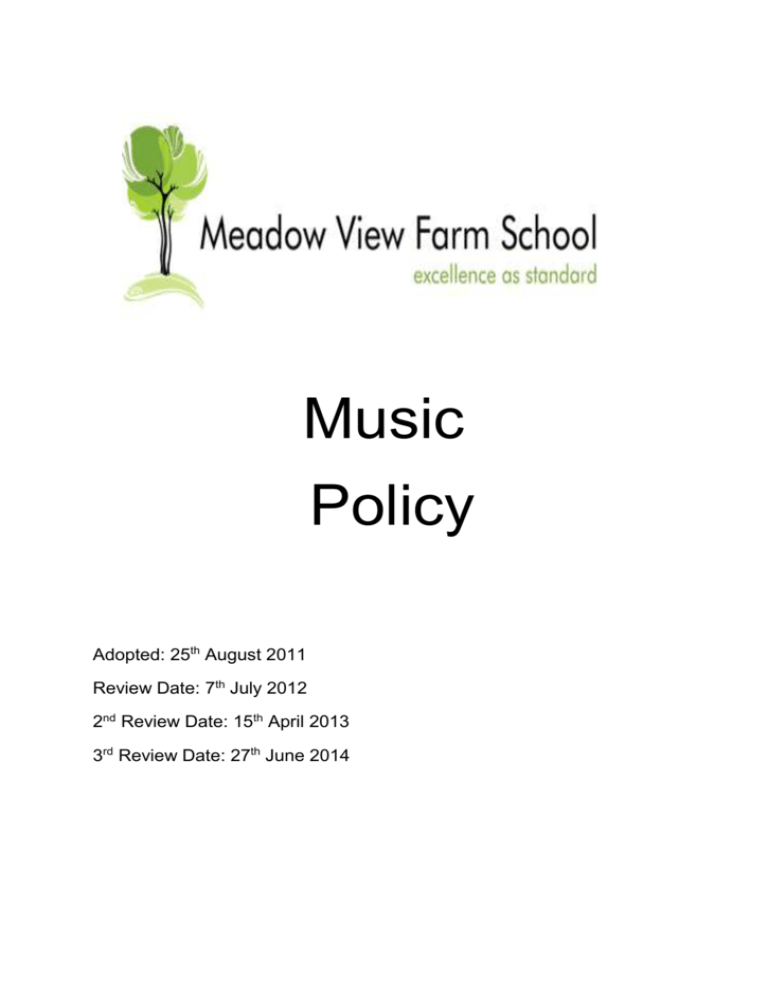
Music Policy Adopted: 25th August 2011 Review Date: 7th July 2012 2nd Review Date: 15th April 2013 3rd Review Date: 27th June 2014 Meadow View Farm School Music Policy This document is a statement of the aims, principles and strategies for teaching Music at Meadow View Farm School. The application of this policy is the responsibility of all staff. Aims Meadow View farm School believes that the study of Music enables children to enhance their personal lives to enjoy performing, composing and appreciating music with others. We help and encourage all children to take part in enjoyable musical activities. Music at all levels helps to instil discipline and promote an understanding that working with others towards a common aim is rewarding. As well as its intrinsic worth as a subject Music also gives children with social, emotional and behavioural difficulties an opportunity to develop necessary functional and social skills in a context away from individual desk based work. Music allows children to develop their own self confidence within an expressive art form and to consider the contribution of others to the group. Music has its place alongside the other arts subjects and is well integrated into the school curriculum. It also allows the children to work with and relate to our peripatetic teacher in school. For these reasons Music is considered to be a particularly worthwhile activity for children with such special needs. Aims, Objectives, Entitlement. Clearly Music offers a great deal in terms of Enjoyment, Achievement and making a Positive Contribution within a Safe and Healthy environment. As part of Economic Well Being Music has a cultural role as an expressive art and a significant aspect of modern leisure. The following Aims and Objectives support these principles. Broad aims include to: Enable each student to grow musically at their own level and pace Develop sensitive, analytical and critical musical responsiveness Develop awareness and appreciation of organised sound patterns Develop an understanding of forms of musical notation Develop instrumental and vocal skills Develop ability to express ideas, thoughts and feelings through music Develop awareness and understanding of musical traditions, styles and cultures from other times and places Foster an enjoyment of all aspects of music Objectives include: To offer every student equal access to Music in the National Curriculum To increase every student’s awareness and appreciation of music through listening, composing, playing and performing, both individually and with others To encourage and develop musical talent To offer the opportunity to learn to play a musical instrument For students to see and hear live music Curriculum Coverage In the National Curriculum orders for the programme of study of music, the subject is described in terms of Knowledge, Skills and Understanding. Teaching should ensure that listening, and applying knowledge and understanding, are developed through the interrelated skills of performing, composing and appraising. The new Charanga online music programme helps teachers cover all aspects of the new Music Curriculum 2014. Alongside this support from the visiting peripatetic music teacher will be given in the teaching of music notation. Teaching Strategies, Practice and Organisation (including the role of TAs) To ensure that the children meet a range of coordinated, progressive musical activities the curriculum is taught in unit based schemes of work based on NC programmes of study using the Charanga on line music programme. This enables individual programme of study statements to be grouped together in a coherent way with specific learning outcomes building upon earlier work, thus enabling future resource requirements to be assessed more easily. LSAs too play an integral role in these lessons assisting students and modelling positive responses to the activities. A balance is achieved by using a combination of the following approaches: ~ whole class - teacher / demonstration led ~ whole class participating at an individual level ~ small group work ~ individual children taking turns at an activity or learning pre-requisite group skills Differentiation in music is based as much upon the needs of the group as well as the needs of the individual. Programmes of study are based upon the Music Curriculum 2014 Assessment and record keeping Children are assessed at the end of each topic in line with the assessment policy and other foundation subjects. Comments about music attainment are included in the end of term reports to parents and local authorities. The Coordinator’s role The coordinator is the lead teacher and role model for the teaching of Music. The coordinator is responsible for the effective implementation of Music in the school. Class teachers are responsible for the delivery of the music curriculum with guidance and advice form the music specialist. Cross curricular links A weekly piece of music introduces our assemblies. As part of our integrated curriculum it is important to make positive connections with other subjects, particularly the arts. When planning.ICT opportunities are included within the study units for children to use relevant software. Other Opportunities We shall encourage regular performances and workshops in the school for children to see, hear and participate in a variety of activities. All children will have access to peripatetic music teacher, which in the first instance will be for recorder lessons. Where a child show particular aptitude further lessons on more advanced instruments may be looked at in consultation with parents/carers. Health and Safety Electrical equipment is regularly PAT tested. Children are taught to use musical instruments appropriately and safely. Resources/Facilities Electric keyboards Acoustic Guitar/Electric guitar Recorders Tuned and untuned Percussion

